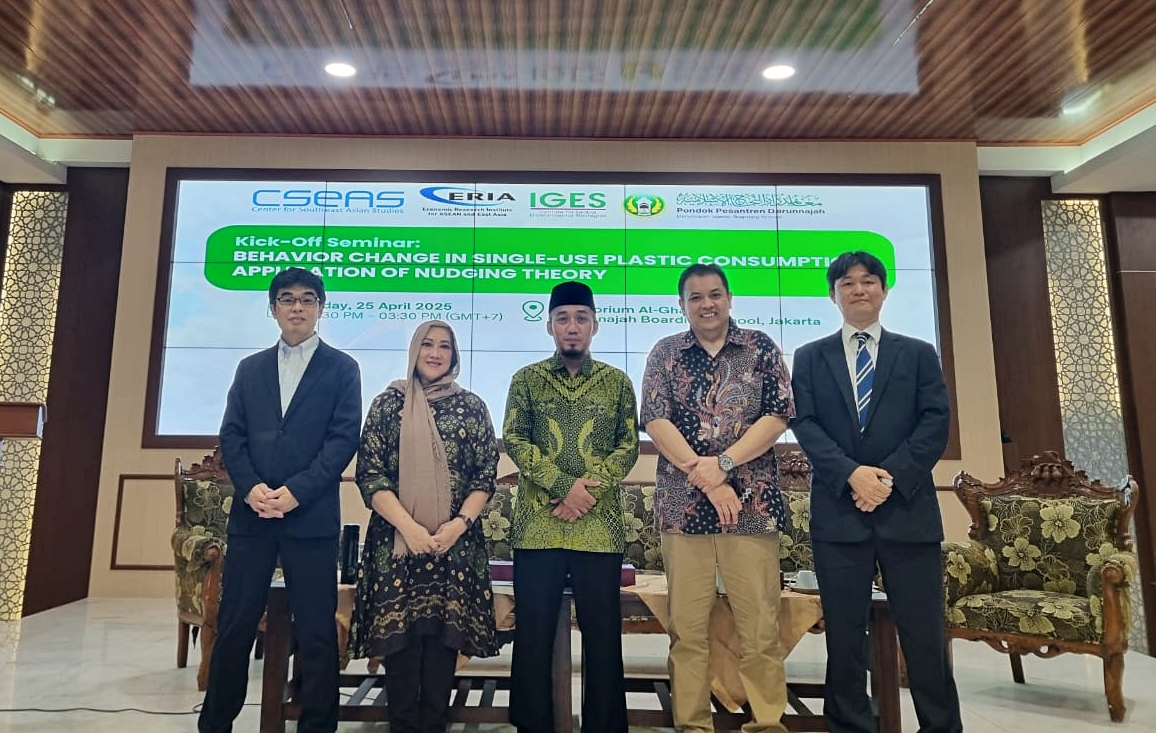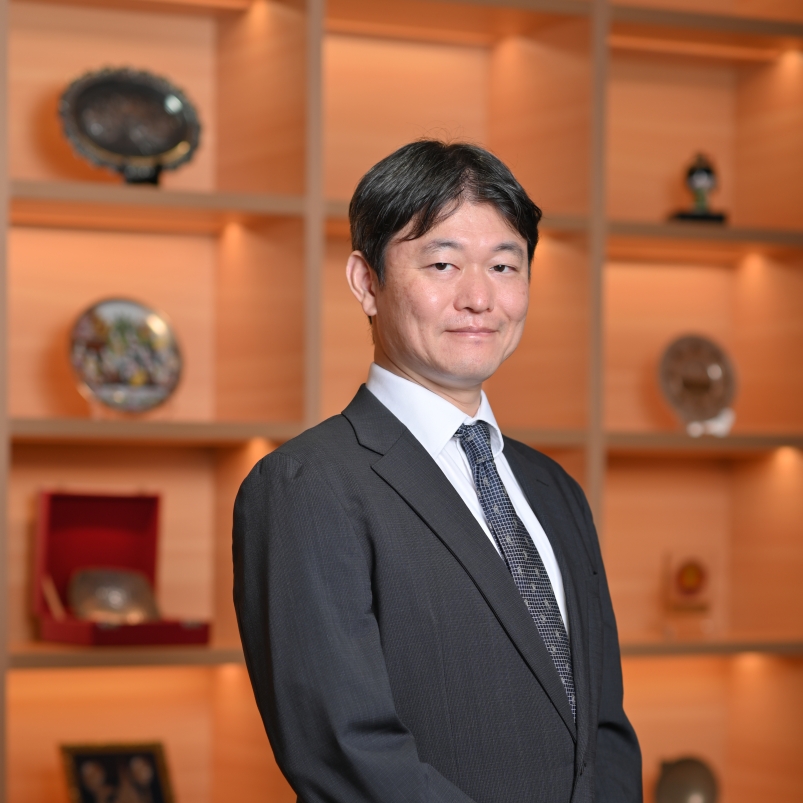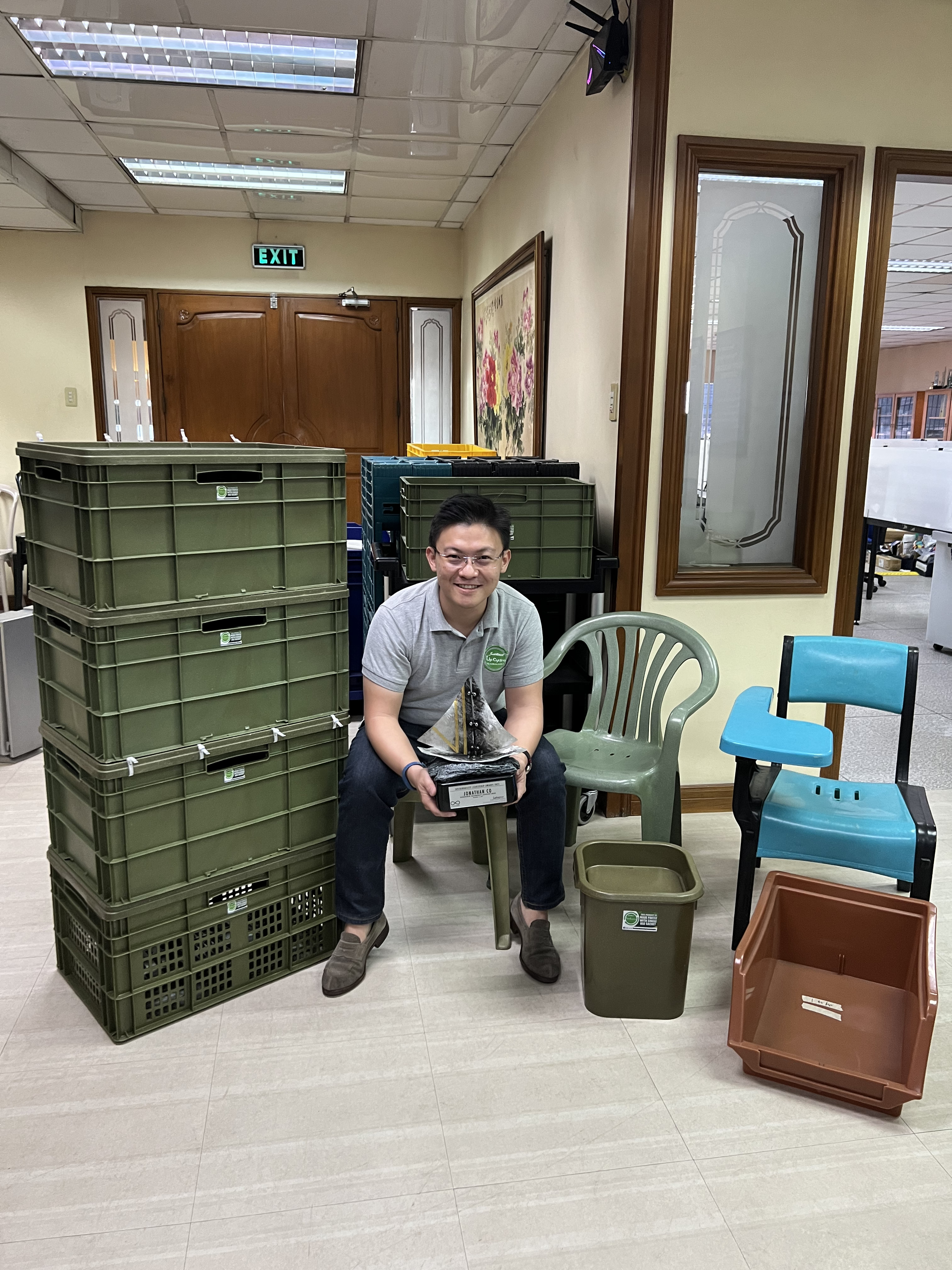

Jakarta, 25 April 2025: ERIA’s Regional Knowledge Centre for Marine Plastic Debris (RKC-MPD) took part in a project kick-off seminar titled ‘Behavior Change in Single-Use Plastic Consumption: Application of Nudging Theory.’ This event was co-hosted by ERIA, the Center for Southeast Asian Studies (CSEAS), the Institute for Global Environmental Strategies (IGES), and the Darunnajah Islamic Boarding School in Jakarta.
ERIA and IGES are conducting Phase II of the pilot project ‘Breaking the Plastic Habit in Asia: Piloting the Application of Behavioural Insights for Plastic Reduction’ across six ASEAN Member States – Cambodia, Indonesia, Lao PDR, Thailand, Viet Nam, and the Philippines. CSEAS is the partner institution of this project in Indonesia. After the kick-off seminar, several initiatives to reduce Single-Use Plastic consumption will be tested in the Darunnajah Islamic Boarding School.
During the seminar, IGES and CSEAS representatives explained the project objectives and the guiding principles to the students, while a Ministry of the Environment representative highlighted the urgency of combating plastic pollution in Indonesia. RKC-MPD Director, Mr Reo Kawamura echoed these sentiments, emphasising the importance of behavioural change in tackling plastic pollution. He pointed out that people often do not lack environmental consciousness, but due to ingrained shopping habits, it has become difficult to refuse unnecessary single-use plastics such as free straws and shopping bags. The behavioural change project aims to address these root causes and encourage sustainable consumption habits to reduce plastic waste, he said. Mr Kawamura concluded his remarks by introducing a new ERIA–IGES initiative called Behavioural Lab, a partnership and platform designed to deliver integrated solutions – including policy recommendations – by joining forces with similar initiatives in the ASEAN region.
During the panel discussion, a student asked about lessons learned from the pilot project. In response, Mr Kawamura explained that the ‘nudging’ theory is not limited to countries like the United States and Japan but is also applicable to ASEAN Member States. While the conditions for success may vary across countries, every AMS, including Indonesia, can effectively apply behavioural change methodologies and contribute to the global effort to reduce plastic pollution.
Jakarta, 25 April 2025: ERIA’s Regional Knowledge Centre for Marine Plastic Debris (RKC-MPD) took part in a project kick-off seminar titled ‘Behavior Change in Single-Use Plastic Consumption: Application of Nudging Theory.’ This event was co-hosted by ERIA, the Center for Southeast Asian Studies (CSEAS), the Institute for Global Environmental Strategies (IGES), and the Darunnajah Islamic Boarding School in Jakarta.
ERIA and IGES are conducting Phase II of the pilot project ‘Breaking the Plastic Habit in Asia: Piloting the Application of Behavioural Insights for Plastic Reduction’ across six ASEAN Member States – Cambodia, Indonesia, Lao PDR, Thailand, Viet Nam, and the Philippines. CSEAS is the partner institution of this project in Indonesia. After the kick-off seminar, several initiatives to reduce Single-Use Plastic consumption will be tested in the Darunnajah Islamic Boarding School.
During the seminar, IGES and CSEAS representatives explained the project objectives and the guiding principles to the students, while a Ministry of the Environment representative highlighted the urgency of combating plastic pollution in Indonesia. RKC-MPD Director, Mr Reo Kawamura echoed these sentiments, emphasising the importance of behavioural change in tackling plastic pollution. He pointed out that people often do not lack environmental consciousness, but due to ingrained shopping habits, it has become difficult to refuse unnecessary single-use plastics such as free straws and shopping bags. The behavioural change project aims to address these root causes and encourage sustainable consumption habits to reduce plastic waste, he said. Mr Kawamura concluded his remarks by introducing a new ERIA–IGES initiative called Behavioural Lab, a partnership and platform designed to deliver integrated solutions – including policy recommendations – by joining forces with similar initiatives in the ASEAN region.
During the panel discussion, a student asked about lessons learned from the pilot project. In response, Mr Kawamura explained that the ‘nudging’ theory is not limited to countries like the United States and Japan but is also applicable to ASEAN Member States. While the conditions for success may vary across countries, every AMS, including Indonesia, can effectively apply behavioural change methodologies and contribute to the global effort to reduce plastic pollution.

Director of the Knowledge Centre


